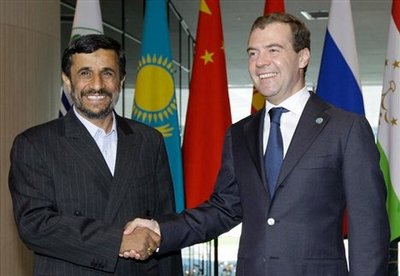 Over at Stratfor, George Friedman has a very interesting piece on the possibility of closer ties between Russia and Iran.
Over at Stratfor, George Friedman has a very interesting piece on the possibility of closer ties between Russia and Iran.
Friedman lays out in detail the key geopolitical factors that are shaping the Iran-Russia-U.S. triangle.
Essentially, Friedman’s tentative conclusion is that Washington’s aggressive policies toward both Moscow and Tehran are bringing the two hydrocarbon exporters closer together.
Meanwhile, in a related move, Russia this month secured access to Turkish waters for its proposed South Stream natural gas pipeline. South Stream will allow Russia to export gas to Europe without going through Ukraine, with which it has very frosty relations at the moment.
The deal on South Stream comes on the heels of an agreement among Turkey, Bulgaria, Romania, Austria and Hungary on the Nabucco project – a pipeline intended to transport Caspian and possibly Middle Eastern gas to Europe via Turkey while bypassing Russia.
The goal of the Nabucco project is to diversify Europe’s natural gas supplies away from Russia. Europe is currently dependent on Russia for 25% of its natural gas imports.
Remarkably, United States Special Envoy for Eurasian Energy Richard Morningstar is denying that South Stream and Nabucco are competitors.
Furthermore, Morningstar says that the Nabucco project – which remember was meant to be an alternative to Russian gas – should be open to Russian gas, but not to Iranian gas.
It will be interesting to watch how long Europe and Turkey are willing to follow U.S. orders and refuse to allow Iranian gas to help fill the Nabucco pipeline. Turkey already imports gas from Iran and says that Iranian gas should be allowed to help fill the pipeline.
Meanwhile, Reinhard Mitschek the managing director of Nabucco Gas Pipeline International is leaving the door open to Iranian participation. He says that It will be up to European customers to decide for themselves whether to import Iranian gas.
For all of Washington’s talk about diversifying Europe’s gas supply away from Russia, it appears that the one move that could actually make a difference – allowing Europe to import Iranian gas – remains off the table.
This situation cannot be sustained indefinitely. Sooner or later, Iran will increase its gas exports and Europe will not be in a position to turn them away.
— Ben Katcher


15 comments on “Russia, Iran, and the United States”